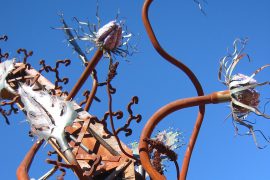The Open Learning Environment (OLE) is a key and highly innovative feature of the reimagined Sydney educational experience. On 20th April, the Board of Interdisciplinary Studies approved around 100 units of study for the OLE (see the full list) – another important landmark in the development of the new curriculum.
All students, undergraduate and postgraduate, will have access to the OLE. It comprises a suite of units that offer students opportunities to build novel skill combinations and extend their knowledge by exploring other fields of study. Most OLE units will be short, modular courses that are supported by online resources and learning activities and allow students to acquire, in flexible ways tailored to their specific learning needs, foundational concepts and methods of other disciplines.
Uniquely, self-contained OLE modules will be available to all Sydney students for free with their online resources and learning activities openly available. For many topics, these 0 credit point modules can be extended by enrolment in 2 or 6 credit point units of study. These units build on the material from the 0 credit point – enlarging or expanding on it through more involved work either online or through face-to-face classes and workshops with more formal assessment. Students in a number of degrees, including the Bachelors of Science, Arts and Commerce will be able to take 12 credit points of OLE units in their degree. All students (and staff!) will be able to take as many 0 credit point units as they like for free.
In many ways, our Open Learning Environment emulates global open educational approaches such as the ‘massive open online courses’ commonly known as MOOCs. The 0 credit point units will adopt a number of educational designs but will, like MOOCs, require self-paced and on-demand approaches with fully online assessment. Unlike MOOCs, however, students will be able to gain credit on their degrees by enrolling in credit-bearing versions to advance their understanding and take advantage of more sophisticated and collaborative learning designs possible in blended online and face-to-face classes. Our OLE is designed to utilise the best aspects of both.
These modules will reflect both the enormous and unique breadth of disciplinary expertise at Sydney and the 21st century skills that our students will need for careers and leaderships roles in Australia, our region and the world in the 21st Century. Topics in the first set of units thus cover areas as diverse as data science, coding literacy, chronic disease prevention, astronomy, entrepreneurial thinking, ethics, creative thinking, music notation and cultural competence. It will be exciting to see which combinations students (and staff!) pick.
Given the novel, innovative and even experimental nature of the OLE units and their place in the curriculum, attention is now turning to their design. Resources from an OLE forum for developers on 14th March are available on the intranet. These are being built on through faculty events and through a highly active ‘OLE Group’ on Yammer. The design of self-paced units of study is ideally suited to the module based structure of our new learning management system and further resources and workshops of how to ‘Think in Canvas‘ are currently being developed.
Many OLE units are also likely to take full advantage of the effective use of video to deliver content and as part of video-based tutorials. Alongside the opening of the new DIY recording booth for staff, tips and resources for making effective videos both using it or from your desktop are also available online and through conversations on the ‘OLE Group’ on Yammer.
OLE coordinators are also invited to the first ‘Welcome to Canvas‘ sessions.






No Comments